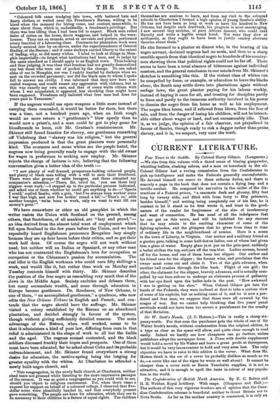CURRENT LrrE RAT URE.
Four Years in the Saddle. By Colonel Harry Gilmer. (Longmans.) —We rise from this volume with a dazed sense of blazing gunpowder, whistling bullets, clashing sabres, and a man on horseback in the air. Colonel Gilmer had a roving commission from the Confederates to pick up intelligence and make the Federals generally uncomfortable. He devoted himself con amore to these arduous duties, and there is scarcely a page in the book that does not contain a flying leap and a terrific combat. He composed his narrative in the. midst of the dis- tractions of a Federal prison, "a casemate dark and gloomy, fifty feet long by twenty wide, and filled with from forty to fifty prisoners, besides himself," and writing being completely out of his line, he is content to let it stand as ho first wrote it, and trust to the good- nature of the reader for forgiveness of the sins of incoherency and want of connection. He has need of all the indulgence that ho can get on this score, and will be indebted for any success that he may attain to the exciting character of some of the fighting episodes, and the glimpses that he gives from time to time of ordinary life in the neighbourhood of armies. Here is a scene in the town of Liberty, in Virginia. Our author and a military friend at a garden gate, talking to some half-dozen ladies, one of whom had given him a glass of water. Empty glass just put on the gate-post, suddenly a bullet strikes the top, and jars off the tumbler. Ladies scream, bound off for the house, and one of them loses her slipper. Our author and his friend race for the slipper ; the former wins, and proclaims that the owner must come out and claim it. Two of the girls advance, when another ball crashes through the lilac bush. Flight of one girl ; the other, the claimant for the slipper, bravely advances, and is actually com- pelled by our beau sabreur to undergo an elaborate process of gallantry with her eye fixed upon the bullet-hole in the post. "How awkward I was in getting on the shoe." When Colonel Gilmer got into the hands of the Federals, they wore inclined at first to take a serious view of some of his exploits, but as nothing came of it, and he is now a par- doned and free man, we suppose that these were all covered by the usages of war. But we cannot help thinking that five years' penal servitude would not have been too severe a punishment for the cruelty of that flirtation.






























 Previous page
Previous page